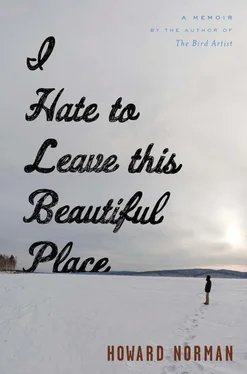Emotionally, as they say, I was in a bad place. Spiritually lost. However, being in Mathilde’s old apartment seemed to help, primarily because I’d taken out a book from the library on séances, which contained a chapter on how to conduct them. Using this chapter as a guide, I held one-person séances at the kitchen table. I’d place various of Mathilde’s paintings and drawings nearby; I’d prop her final postcard against the candleholder. Mementos and conveyances, talismans and channeling objects. I quickly became a charlatan, a purveyor of false encouragement toward my own self. Passerbys looking in through the street-level window would’ve seen a young man sitting at a table with a freshly ironed tablecloth on it, a single candle in a solid iron holder, and the book on séances open like the Bible, for easy reference.
“Don’t tell any of your colleagues at the hospital what you do with this nonsense,” Isador warned me. “You tell them, they’ll put you in a straitjacket and out come the syringes.” He was only half joking. “That typewriter I gave you,” he said. “Start writing something. How about you write me a long letter every day. Sit down when you come home from work and type. Anything. I’ll provide the envelopes and stamps. Get your imagination up and running.”
Isador had far more faith in the rejuvenating, or at least distracting, powers of writing than I knew to have. I continued the séances for weeks. In all that time I thought I heard Mathilde’s voice just once, though I suspect I’d fallen asleep at the table and dreamed it, then started awake, confused. “Did you know that [garbled name] used to mix ashes in with his paint sometimes?”—that was the one sentence that flew in from my version of Mathilde’s afterlife, as if that dream had been the whole of her afterlife. I suppose this related to Mathilde’s having been burned to ash in the airplane wreckage.
Self-generated, idiosyncratic forms of mourning — if that’s what I was doing — while excessively indulgent, probably don’t harm anyone else, and can for a time sustain a person. They did sustain me at least. My theory was, the best way to prove the depth of my love for Mathilde — the very capacity to love — was never to give in to convenient notions of closure. Do anything to keep the wound open, not merely in order to feel pain, but to feel pain as a way of staying connected.
To that end, I opted for obsessive scholarship about the Saskatchewan landscape. In a way, I suppose I saw that western province as being her cemetery. Before the Internet, researches in the world of antiquarian books and esoteric texts required, to say the least, more fortitude and brainstorming. I’d befriended a professional researcher, Anne Handle, who offered me all sorts of advice on how to obtain monographs, books, and articles about Saskatchewan. I read them one after the other with various levels of comprehension (some were impenetrably “scientific”); this was the closest thing I had, short of setting up house there, to being on the very earth of Saskatchewan.
I should have understood better at the time that the depth of my obsessive dedication to Mathilde after her plane crashed was severely disproportionate to the emotional distance I’d kept from her when she was alive. I never could bring myself to say I loved her. “You don’t need to say the words,” she said more than once, as if taking jurisdiction over my inability to say them. It wasn’t my age, or our age difference; a lot of twenty-year-olds were capable of saying those words and meaning them; it was my fear. One insomniac night I thought, If I say the words I’ll have to admit to myself the fact that I mean them. I should have told the truth and said them to Mathilde.
Isador said, “My opinion is, if you move permanently to Saskatchewan, you’d be going overboard. That would be meshuggeh. It wasn’t your place, it was hers.”
My janitorial duties at the hospital went swimmingly. I was never late for work, not once, and Mr. McKenzie took note of that. I got a small raise within two weeks. The hallway of the children’s ward was a difficult place to work, because I saw kids who were dealt such bad hands. There was one little girl, Ellen, age eleven. As for her medical condition, all I was privy to was the fact that she suffered seizures. I witnessed one of these, just one, but that was quite enough for permanent memory. Ellen’s mother, Jean, often spent the night in the room. Jean was wealthy; her family had a house in the south of France and an apartment in London. Ellen’s father was a diplomat of some sort; I saw him only once. But the money was from Jean’s family. “They’re in import-export,” she said.
One time in the all-night hospital cafeteria, Jean said, “You want to know something? Ellen thinks that floor polisher is the funniest thing she’s ever seen. She doesn’t think you’re very good at it. You’re not very good at it, are you? But when Ellen sees you push by her door with that unwieldy machine, she just cracks right up. It’s like a cartoon to her. You didn’t know that, did you?”
“I had no idea. Why’s she think it’s so funny?”
“Because she does. It’s just her sense of humor.”
We continued talking, and Jean asked how I’d come to be employed as a night janitor. She seemed truly interested, so I told her how I’d gotten “caught up” at the auction. I remember her saying, “It’s like a crime of passion,” an analogy I didn’t fully comprehend, though it was said with sympathy. She asked more about my life. But I didn’t mention Mathilde at all; it seemed too complicated. Too many frayed threads. Over the weeks I spoke with Jean half a dozen more times in the cafeteria. I sat and talked with Ellen a few times, too, and once, during a break, read her twenty or so pages of A Tale of Two Cities, which her mother had been reading to her before needing to run home for some reason or other.
In the meantime, I was paying my debt to the auction house. And during the afternoons I was reading about Saskatchewan. I was doing little else, except writing to travel editors and Sunday magazine editors of newspapers throughout Canada and the United States with proposals for writing about birds in places as far-flung and alien to me as Indonesia, South Africa, and Japan — and of course every province of Canada. In each envelope I enclosed my one published article about the birds near Port Medway. My mailbox was not even filling up with rejections, let alone offers of work.
The novels I was reading at the time deftly orchestrated implausibilites along a clear narrative line, but I could not locate such a line in my own life. Every day seemed autonomously haphazard; one day was disconnected from the next. There was no unifying element of thought or strategy, just a bridging ennui and puzzlement. I’d set aside plans to take courses at McGill University. Then, early in March 1970, as she was leaving her daughter’s hospital room, Jean offered me a job at her travel agency. I thought it made no sense whatsoever, except perhaps that she felt sorry for me, a wannabe writer pushing a floor polisher around. I wrote travel brochures for her. They had mandatory categories: climate, entertainment, transportation, language — politics were to be avoided. And I was to incorporate upbeat quotes from people who had used Jean’s travel agency and had had wonderful times in Egypt, Spain, France, Belgium, Holland, Japan, Brazil, and so on. As for foreign countries, I myself had been only to Canada.
Now I had two jobs and was more confident of paying off my debt to the auction house, but I was sleeping only a few hours a night. Plus, I was often wired on caffeine. I drank up to ten cups of regular coffee a day and, most often in Mathilde’s and my old café, at least three espressos. (It was one of the few places where espressos were served in those days.) Sleep usually consisted of catnaps on a sofa in the lobby of the Lord Nelson Hotel. I felt I had more than one address. And in and around all of this, I was still maniacally studying up on Saskatchewan, where Mathilde’s ghost might be wandering. My private séances were failing; she wasn’t to appear in her old Halifax apartment.
Читать дальше












